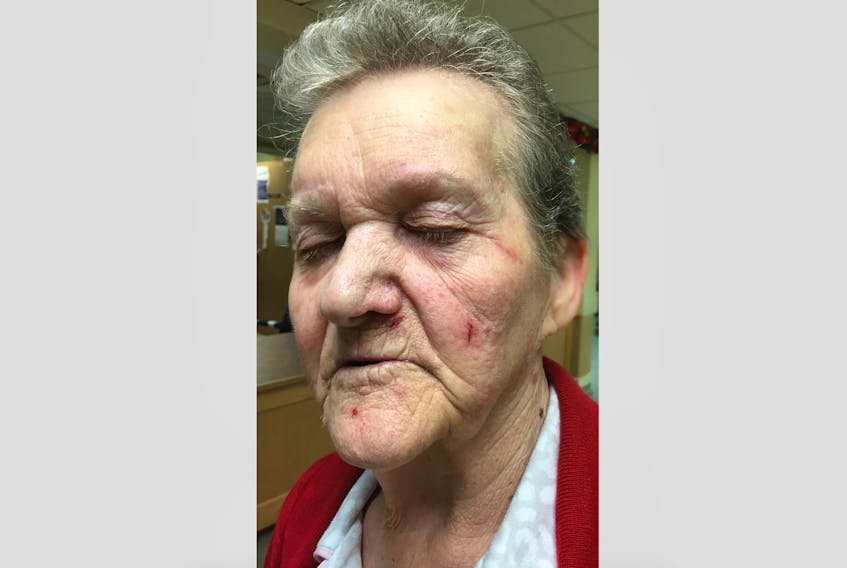GANDER, NL – Sharon Goulding-Collins is fighting for change.
The Hare Bay resident wants improved care for long-term care patients – particularly regarding hygiene and safety.
These are issues that first caught her attention after her mother, Lilian, was admitted to Lakeside Homes in Gander in April 2015.
Goulding-Collins claims her mother was only getting one bath per week and obtained several injuries throughout her time at the long-term care facility.
During the early days, when her mother was still very aware of what was happening, Goulding-Collins said she “had been slapped and punched in the stomach by a male resident.”
There would be a number of other injuries to follow, including a fall that left a bump “the size of an egg on her head.”
At another point, her mother had fallen, and Goulding-Collins said no one was aware she had fallen or how long she had been on the floor before she was found.
In just over six months, Goulding-Collins documented between eight to 10 incidents.
Lobbying for change
Goulding-Collins eventually arranged two baths per week for her mother. Initially she received one bath per week, with sponge baths administered throughout the remainder.
But Goulding-Collins believes more needs to be done for all residents at these facilities, as poor hygiene can bring about several health issues.
When it comes to residents’ safety, Goulding-Collins places the responsibility solely on management.
“(Residents facing Alzheimer’s and dementia) don’t have the cognitive ability to think, react and respond as normal adults,” she said. “Central Health and the management of these institutions are responsible for their safety. These incidents shouldn’t be happening.”
Goulding-Collins sees staffing shortages as the biggest problem.
While long-term care facilities may bolster a full staff, she says it’s not enough to manage the needs of those requiring constant care and supervision.
“The overall number of staff hired to care for these residents, it’s not adequate. They are understaffed,” she said. “Government policy, which dictates the overall number of staff, needs to be increased.
“Once that’s done, it will allow for additional hygiene care and provide more safety (with speciality trained staff) in preventing injuries of any kind.”
Not alone
After forming the Facebook group Advocates for Seniors’ Rights, Goulding-Collins found out she wasn’t alone.
“And the stories you hear are absolutely jaw-dropping, you can’t believe some of the stuff that’s happening within the healthcare system,” she said of what group members have shared.
The overwhelming support continues to motivate her to push forward.
“We will not be going away quietly,” said Goulding-Collins. “Not until something changes to improve the lives of all long-term care residents.”
Central Health response
According to a statement, Central Health says it offers bathing in the form of showers, tub baths, full body sponge baths, and/or bed baths. However, this type of bathing and frequency depends on individualized resident care plans, resident preferences, ability to participate in the activity, national and international standards, and best practices.
The statement says residents receive a full tub bath once a week and a “full body” sponge baths each morning.
“For LTC (long-term care) residents, full body sponge baths and/or bed baths have a number of benefits,” according to the statement. “This resident-focused approach to personal grooming is ideal for LTC residents who experience physical pain getting up and getting out of bed, may be disoriented and/or prone to falls due to lack of balance and strength, or have dementia (as the bathing activity is both physically and emotionally demanding).”
It added resident’s care and service needs are, at a minimum, reassessed on a quarterly basis.
When it comes to staff, Central Health indicated it has full staffing levels at its 11 long-term care facilities, adding nursing care is provided on a 24-hour basis by registered nurses (RN), licensed practical nurses (LPN), and personal care attendants (PCA), and that all staff have been trained in the “Gentle Persuasive Approach, a core competency of the dementia care training model.”
The health authority recognizes persons living with dementia can become combative, which can escalate as the disease progresses. These residents live in the protective care units of its long-term care facilities.
“Following the Gentle Persuasive Approach to dementia care, plans are in place to mitigate risks to self and others (other residents and staff),” the statement reads. “Regular safety checks/monitoring and risk-safety plans are developed and adjusted as a resident progresses in his or her dementia.
“Central Health has implemented a Falls and Injury Prevention Program, which is an important component of theHealthy Aging Strategy. This program is based on components of the Canadian Falls Prevention Curriculum.”









